As of late, it seems to be as if the best way ahead for software program program builders is bleak with the rise of no-code platforms. Fortunately, there’s a technique to make ourselves further setting pleasant proper now by leveraging our current talents to assemble new apps using low-code platforms. In distinction to no-code, low-code platforms are further versatile and provide larger customizable choices. You can write custom-made code snippets and arrange Node.js packages to supply your app further superior choices.
On this text, I’ll present a high-level overview of Back4App, a Backend-as-a-Service(BaaS) platform that hosts Parse capabilities for builders. BaaS platforms allow builders to quickly develop and launch new back-end apps with minimal effort. Moreover they eradicate the need to rearrange web internet hosting and configuring autoscaling, which might be a time-consuming job for builders.
Key Takeaways
- Low-Code Flexibility: Back4App, using the Parse Platform, presents a low-code decision that retains flexibility for builders, allowing the mix of custom-made code snippets and Node.js packages for superior app choices.
- BaaS Advantages: As a Backend-as-a-Service (BaaS), Back4App simplifies the occasion course of by providing web internet hosting, configuration, and autoscaling, enabling builders to launch back-end apps quickly and successfully.
- Database Decisions: Parse helps every MongoDB and PostgreSQL, offering flexibility in choosing between a NoSQL or SQL database primarily based totally on endeavor requirements and developer expertise.
- Multi-Tenant Capabilities: Back4App’s dashboard permits for the administration of various Parse apps, significantly reducing the time and effort required compared with explicit individual setups.
- Full Backend Choices: The Parse Platform on Back4App comprises sturdy backend choices corresponding to database administration, authentication, keep queries, push notifications, and cloud options, amongst others.
- Extensibility by way of Adapters and Modules: Builders can lengthen the capabilities of their Parse Server apps by placing in assorted Node.js packages and Parse Adapters, enhancing efficiency and integration with totally different suppliers.
What is the Parse Platform
The Parse platform is a popular, open-source framework for setting up utility once more ends. It runs on Node.js and is written to work with Categorical.js. Merely put, it’s like an open-source mannequin of Firebase which you can run in your machine and host by your self server.
The origins of the endeavor date once more to 2011, when Parse Inc was primarily based to supply a back-end system for mobile builders. The startup raised $5.5 million in enterprise capital funding, which allowed it to develop its shopper base to twenty,000 builders inside a yr.
The company grew to change into so worthwhile that it was acquired two years later by Fb for $85 million. By 2014, the platform was web internet hosting about 500,000 mobile apps. Sadly, Fb did not take a place throughout the development of the platform and decided to shut down the service by January 2017. With the intention to assist its purchasers, Fb open-sourced the Parse platform in an effort to allow builders to migrate their apps to their very personal self-hosted Parse server.
Since then, the open-source neighborhood has frequently labored on the endeavor and has constructed an web web site, on-line documentation and neighborhood dialogue board. Proper now, Parse provides loads of back-end choices that embody:
- database administration
- file object storage
- REST and GraphQL APIs
- authentication
- shopper permissions
- keep queries (real-time info)
- push notifications
- cloud options
- cloud jobs
The Parse platform is principally made up of:
- Parse Server: a headless server for setting up back-end apps.
- Parse Dashboard: a front-end shopper interface constructed with React.
- Parse Server Modules: a set of modules and adapters that extends Parse Server’s choices. As an example, you can arrange an adapter to leverage Firebase’s authentication service.
- Shopper SDKs: language libraries for connecting front-end apps to Parse Server. These libraries embody JavaScript, Android, Aim C, Flutter, Unity and many others.
Remember that there are a variety of Parse initiatives that I haven’t talked about proper right here. As an example, there are Android and IOS apps that current front-end interfaces for Parse server.
Mongo vs PostgreSQL
Parse server at current helps Mongo and PostgreSQL databases, which can be the principle databases throughout the NoSQL and SQL areas respectively. Every databases are pretty succesful, which makes it powerful to resolve on which one to associate with.
This detailed info may be of assist. For my part, within the occasion you’re a beginner, MongoDB is a greater choice, as a result of it’s further versatile and has a shallower finding out curve. Should you occur to’re an expert SQL developer, you’d be further productive with PostgreSQL. Beneath is a quick comparability for each database.
Mongo
Professionals:
- versatile schema: most interesting for model new initiatives whose requirements aren’t completely acknowledged
- horizontal scalable: can merely server hundreds and hundreds of shoppers
- helps realtime info updates and reads; good for analytical capabilities
- sharding: can cope with massive datasets merely
Cons:
Earlier factors like ACID compliance and JOINS for the time being are formally supported throughout the latest variations of MongoDB.
PostgreSQL
Professionals:
- rigid schema: most interesting for initiatives with acknowledged requirements and strict info integrity
- referential integrity/abroad key constraint help: requirement for outlining desk relations
- out-of-the-box help for ACID transactions
- makes use of SQL, the best query language for accessing and manipulating info
Cons:
- longer finding out curve
- can solely scale vertically; horizontal scaling is possible nonetheless not easy
Should you occur to’re nonetheless confused about which one to utilize, fortunately Back4App has an answer for you.
Back4App
Back4App is a cackend-as-a-service agency that hosts Parse server apps for builders at a cheap payment. It enormously simplifies the occasion of Parse apps. All you would possibly wish to do is to enroll for a free tier account (no financial institution card) to get started with 250MB of knowledge storage and 25k requests.
Paid plans provide larger helpful useful resource quotas and further choices corresponding to backups, info restoration, CDN, auto scaling and extreme request effectivity. The free plan solely is just actually useful for finding out, whereas the paid plans are in a position to coping with lots of of requests per second. See the full pricing internet web page for further particulars.
Multi-tenant dashboard
Back4App means that you could create and deal with various Parse apps on the similar dashboard. This could be a large time saver compared with manually placing in, configuring and web internet hosting each parse server your self. The excellence is minutes vs hours.
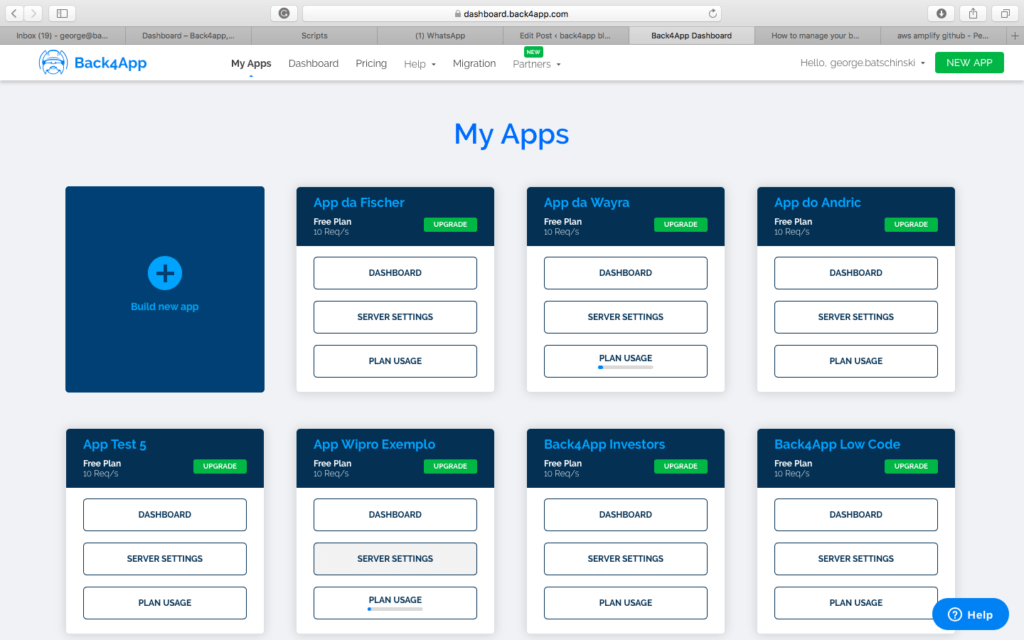
Database browser
Back4App makes use of Mongo for the database. Nonetheless, it behaves as if it’s working PostgreSQL. That’s good, since you get the advantages of SQL databases whereas using a non-SQL one — corresponding to referential integrity, abroad key constraints and schema validation. This implementation is accomplished in code and runs between the database and the dashboard.
The database browser organizes tables (collections) as classes and data is specified by a spreadsheet format. You can add/edit/delete/reorder columns, specify info types, and import/export info in CSV or JSON codecs.
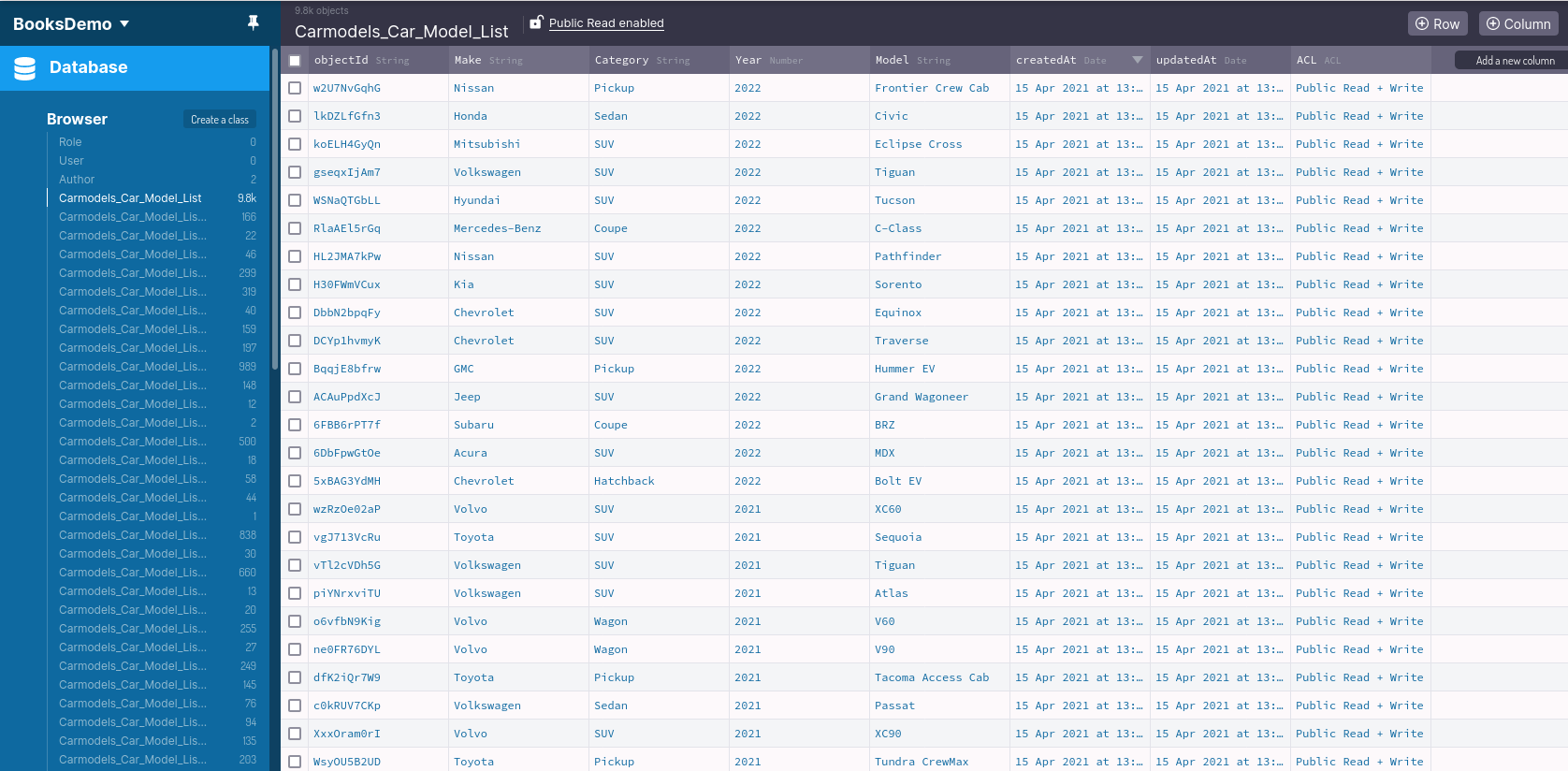
The spreadsheet interface means that you could create and edit rows of knowledge merely. You may additionally add binary info corresponding to footage or PDFs into columns which have the File info kind. That’s one different large time saver, as you don’t must configure a file storage service to cope with binary info. With Parse, it’s already built-in and configurable to help exterior file storage suppliers.
Authentication
Parse provides a built-in e mail/password authentication service. Clients and roles are saved throughout the database and could be thought-about and created by the use of the database browser. Clients can also be created programmatically by the use of SDK, REST or GraphQL API endpoints.
Proper right here’s an occasion of a sign-up carry out utilized on the doorway end using the Parse JavaScript SDK:
carry out signUp() {
let shopper = new Parse.Particular person();
shopper.set("username", "alex");
shopper.set("password", "abc123");
shopper.set("e mail", "a@abcd.com");
attempt {
shopper.signUp();
} catch (error) {
alert("Error: " + error.code + " " + error.message);
}
}
Back4App permits builders to permit e mail verification and password restoration choices for his or her Parse apps. These are essential account administration choices that prospects depend on when using any protected utility.
Together with the default authentication method, you can enable your Parse app to authenticate using any of the subsequent join methods:
- Apple
- Fb
- GitHub
- and many further
Authorization
Authorization determines if an authenticated shopper has entry to data saved on the database. Permissions are outlined with the utilization of Roles and Entry Controls. There are two ranges of entry controls:
- Class-level permissions (CLP) : considered one of these permission protects all the knowledge in a class(desk). You can define fully totally different be taught and write insurance coverage insurance policies for each operate using CLP.
- Object-level entry administration: This form of permission protects explicit individual rows. This allows one shopper’s info to remain separate from one different shopper inside the same class (desk). Parse moreover helps separating info for anonymous prospects using intervals.
Parse makes use of entry administration lists (ACL) to protect private info from being publicly accessible. Nonetheless, if the patron has some info that have to be shared publicly, a second ACL have to be created to have the ability to grant public entry. Do phrase that class-level permissions will on a regular basis override ACL permissions.
Blockchain database
This could be a new attribute that permits storing info in a private Ethereum blockchain group. Blockchain differs from a typical database in that, as quickly as info are inserted and verified, they are going to’t be updated or deleted. This has many smart implementations the place perception between occasions is essential in a enterprise transaction.
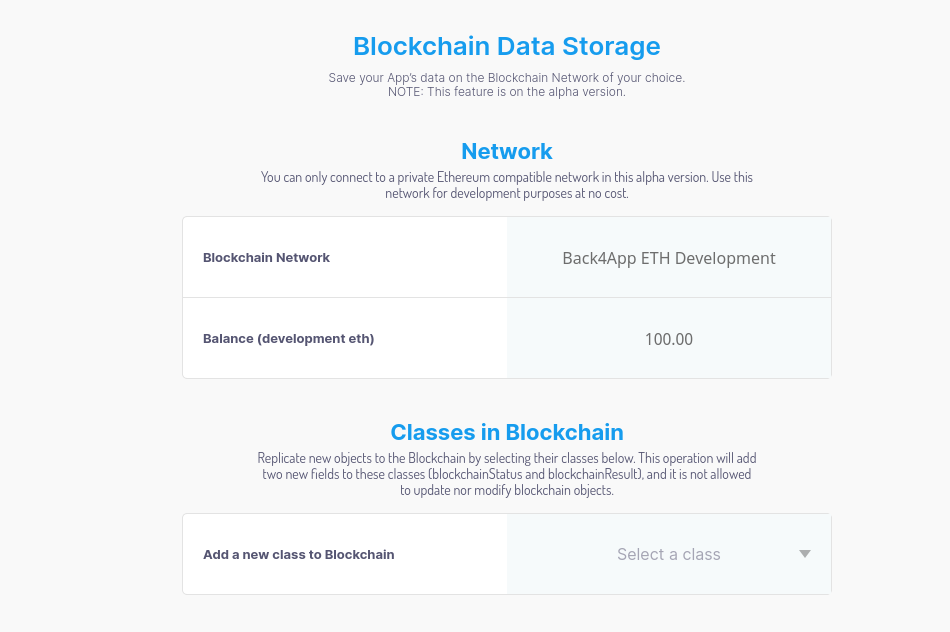
On the time of writing, this attribute stays to be throughout the alpha stage.
Public Datasets
Often when setting up shopper interfaces, you’ll must populate certain enter components with info corresponding to file of countries, cities, zip codes, automotive fashions, colors, and so forth. Back4App solves this downside by providing the Database Hub, a listing of public databases which you can freely entry and use in your app.
A dataset occasion of all the cities of the world is pictured beneath:
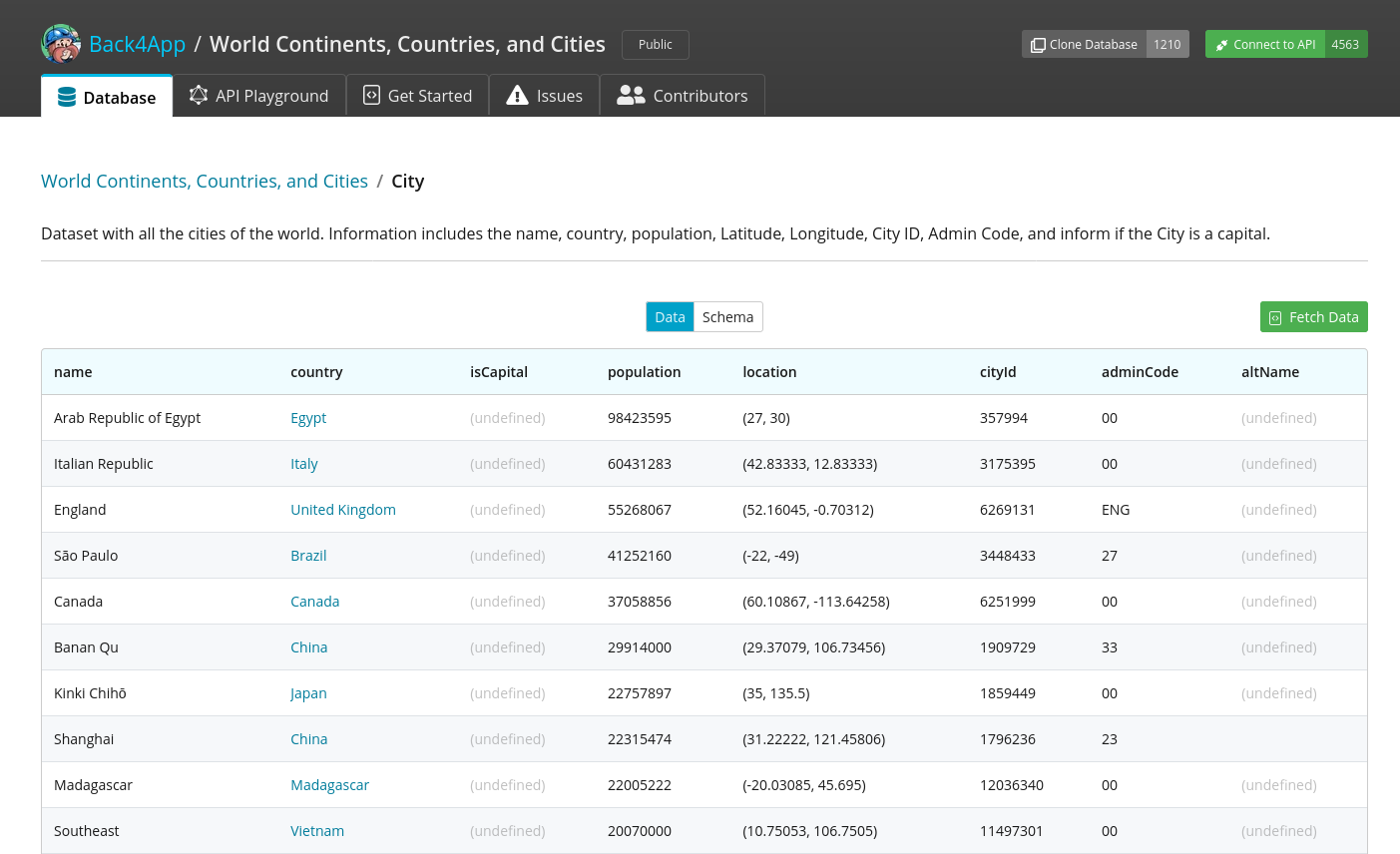
There are 3 methods of accessing a public database:
- You can be a part of a public database to your app. As quickly because the connection is worthwhile, you can query the database by the use of REST or GraphQL by the use of your app. This method permits your app to acquire any new updates to the schema and data.
- You can clone most of the people database to your dashboard in a model new app.
- You can export a public database into CSV or JSON format, after which import it into your app.
The ultimate two methods imply you possibly can modify most of the people datasets as you need.
Reside query
When setting up real-time capabilities, likelihood is you may be pressured to fetch new info each or so seconds to have the ability to take a look at if there’s been any new substitute. This technique is known as polling, and it’s problematic, on account of it causes extreme group and server utilization. Take into consideration in case your app is being utilized by tens of lots of of shoppers.
Parse has a built-in protocol usually referred to as LiveQuery that permits purchasers to subscribe/unsubscribe to a LiveQuery server. When the associated info is updated, the LiveQuery server pushes the model new info to all purchasers which have subscribed to it.
With Back4App, activating the LiveQuery server is as simple as going to your App’s Server settings > Server URL and Reside Query and activating it.
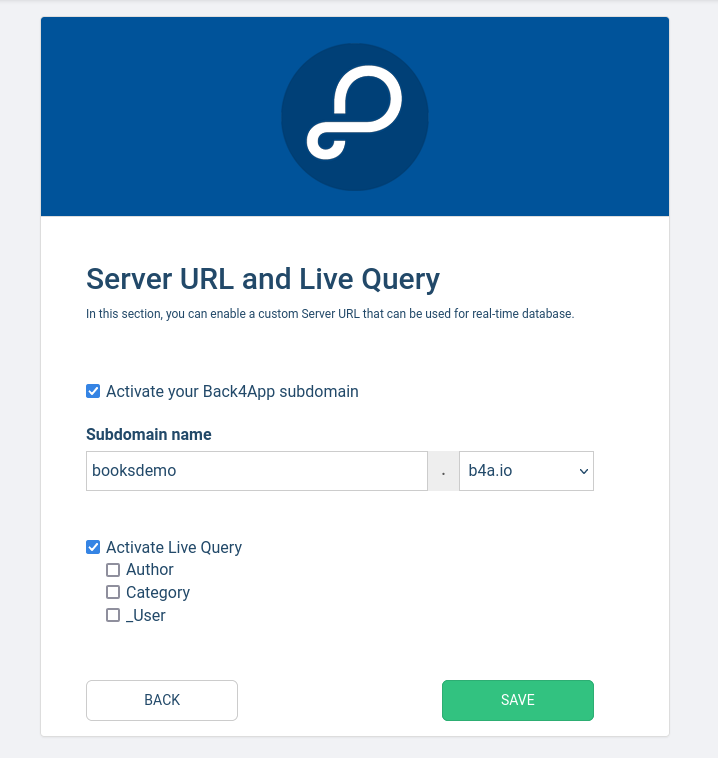
Cloud Code Capabilities
With front-end–heavy capabilities, a great deal of info manipulation is accomplished on the consumer machine. Often this requires sending large portions of knowledge so that the front-end code can course of and use it to point out a summary of the information. End prospects are vulnerable to experience sluggishness using your app.
Parse provides a built-in attribute usually referred to as Cloud Code Capabilities that permits all the heavy info lifting to be carried out on the server itself. As an example, in the event you want the widespread sale price of a particular product throughout the last yr, you can merely retrieve all of the necessary info contained in the server ambiance, perform the calculation and ship the value to the front-end shopper.
Performing such actions on the server is quicker, further setting pleasant, and might finish in a smoother experience for the tip prospects. One different benefit of Parse’s Cloud Function is that it runs in a full Node.js ambiance, in distinction to AWS Lambda and Cloudflare Employees. This means you can arrange any Node.js bundle deal you want with out having to resort to workarounds.
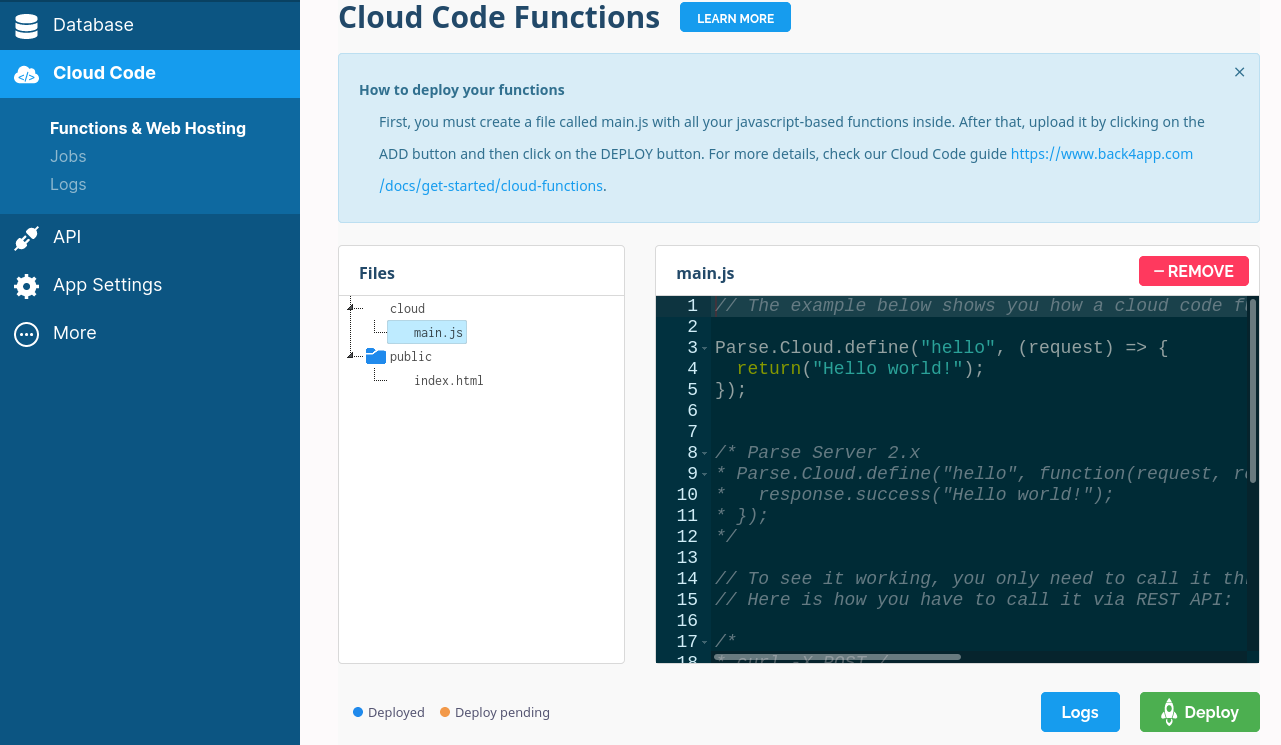
Listed under are examples of Cloud Code Capabilities that run in your Parse Server app:
Parse.Cloud.define("hey", async (request) => {
console.log("Hey from Cloud Code!");
return "Hey from Cloud Code!";
});
Parse.Cloud.define("sumNumbers", async (request) => {
return request.params.num1 + request.params.num2;
});
Proper right here’s how one can title Cloud options out of your frontend app:
const helloResult = await Parse.Cloud.run("hey");
const params = { num1: 3, num2: 4 };
const sumResult = await Parse.Cloud.run("sumNumbers", params);
You may additionally implement superior choices with Cloud Code Capabilities, corresponding to sending SMS textual content material messages to any cellphone using the Twilio API:
Parse.Cloud.define("SendSMS", async (request) => {
let getMessage = request.params.message,
getPhoneTo = "+Aim check out Cellphone amount",
getPhoneFrom = "+Your first Cellphone amount",
accountSid = "AccountSID",
authToken = "AuthToken";
let shopper = require("twilio")(accountSid, authToken);
return await shopper.messages.create({
physique: getMessage,
from: getPhoneFrom,
to: getPhoneTo,
});
});
Completely different superior examples of cloud options you can implement in your Parse Server app embody accepting financial institution card funds by the use of the Stripe API and sending emails by the use of the SendGrid API.
Triggers
Triggers are cloud options that imply you possibly can implement custom-made logic corresponding to formatting or validation sooner than and after an event. Take a look at the validation code occasion beneath:
Parse.Cloud.beforeSave("Consider", (request) => {
},{
fields: {
stars : {
required:true,
decisions: stars => {
return stars >= 1 && stars = 5;
},
error: 'Your evaluation must be between one and 5 stars'
}
}
});
On this occasion above, the validation code ensures that prospects can’t give decrease than a one- or better than five-star rating in a evaluation. In some other case, the consumer will acquire an error. Parse at current helps the subsequent types of triggers:
- save triggers: useful for implementing a selected info format
- delete triggers: useful for implementing deletion insurance coverage insurance policies
- uncover triggers: useful for transforming info
- session triggers: useful for blocking a banned shopper or monitoring a login event
- LiveQuery triggers: useful for implementing limits
With Cloud Code, you can assure the similar conduct for all the shopper apps that you just help — corresponding to internet, Android, iOS, and so forth.
Cloud Jobs and Scheduling
Cloud jobs are merely long-running options the place you don’t depend on a response. Examples embody batch processing an enormous set of images, or internet scraping. You may additionally use cloud jobs to hold out duties such eradicating inactive prospects that haven’t verified their emails.
Do phrase Parse server doesn’t current scheduling. Fortunately, Back4App does — by way of a attribute usually referred to as the Cron Job. You merely write a cloud carry out on this format:
Parse.Cloud.job("jobName", async (request) => {
return "job outcomes";
});
Subsequent, you add the cron job code to your app, and then you definately definately use the Background jobs attribute to schedule when your code must run.
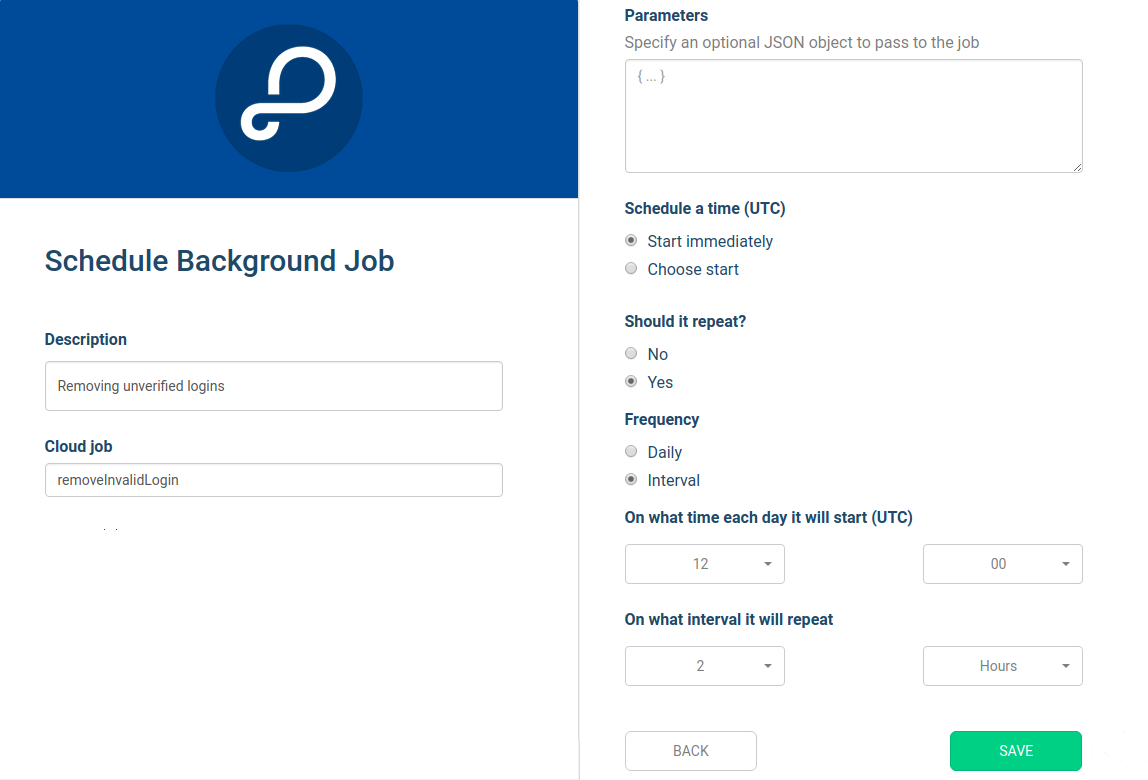
Modules and Adapters
You can extra lengthen the capabilities in your Parse server app by placing in Node.js packages and Parse Adapters. The image beneath reveals a number of of the adapters maintained by the core Parse neighborhood.
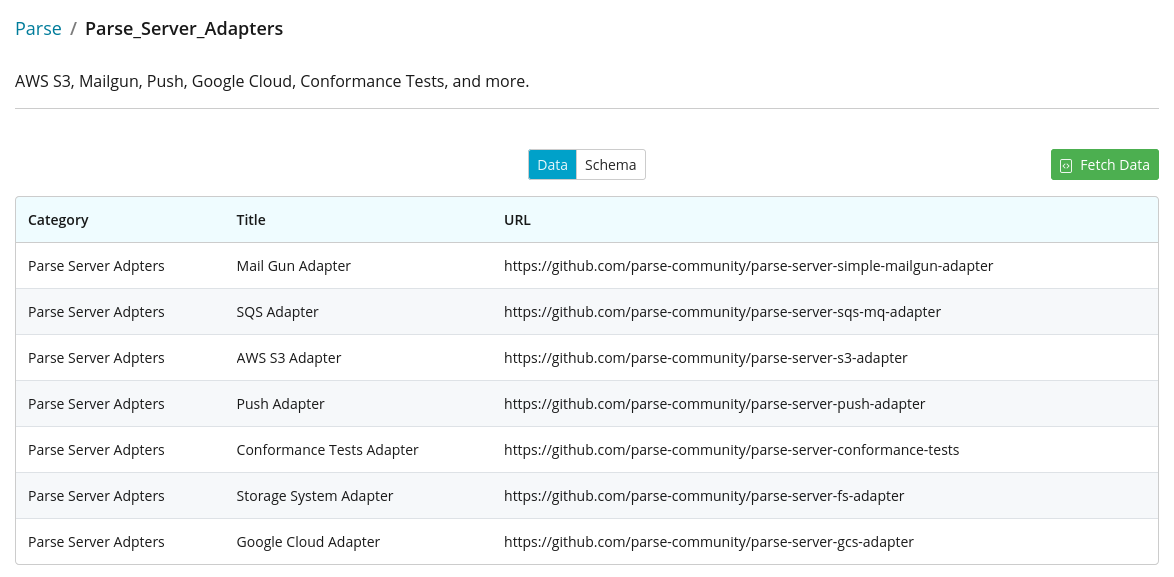
Adapters are merely Node.js packages which may be put in by importing a bundle deal.json file to your Cloud Capabilities dashboard. An occasion of an adapter is the parse-server-sqs-mq-adapter which allows integration with of a Parse Server app with Amazon Simple Queue Service.
Sadly, a lot of the community-contributed adapters and modules have been deprecated or aren’t being actively maintained. So that you simply’ll probably wish to make use of an formally supported npm bundle deal and write custom-made code to have the ability to assure your code is protected by using the newest dependencies.
Server logs
Should you occur to make use of any console.log or console.error options in your Cloud Code, they’ll be displayed throughout the Cloud Code > Logs dashboard, as pictured beneath.
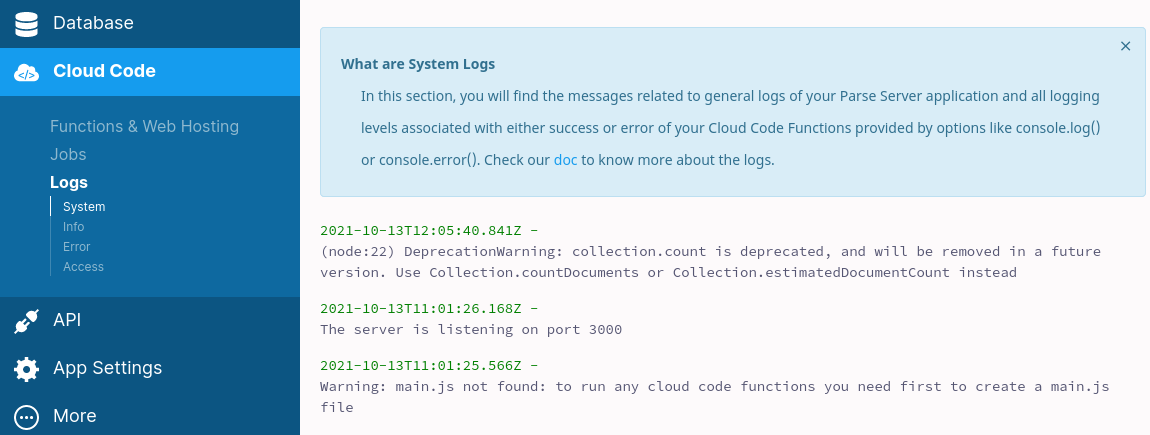
Logs could be thought-about throughout the following courses:
Event logging is an important aspect of working manufacturing apps, as it can most likely help you to understand requests and uncover bugs in your code.
Analytics
Back4App provides Analytics reporting devices — which is a bonus attribute, as a result of the open-source Parse Server solely helps capturing of knowledge nonetheless not reporting. Back4App’s Analytics reporting system helps in providing real-time particulars about your app corresponding to progress, conversion, effectivity and utilization conduct.
The system comes with a set of pre-defined monitoring research which embody:
- viewers research
- events research
- effectivity research
- sluggish requests report
The image beneath reveals an occasion of a Effectivity report.
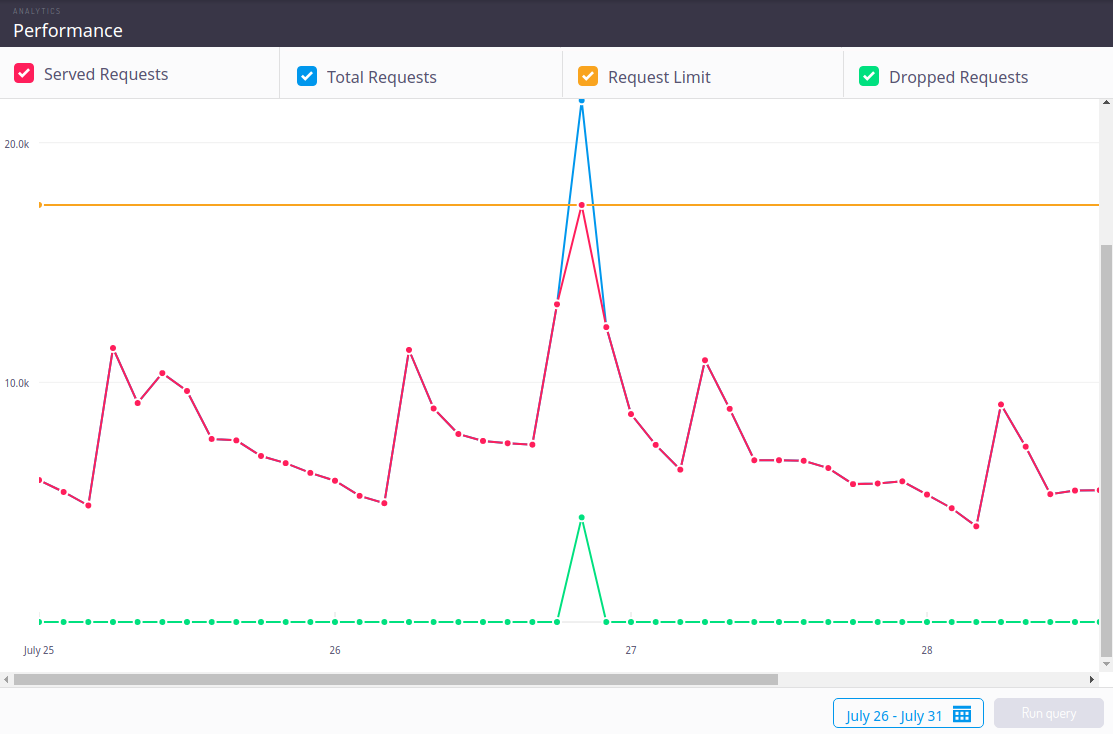
You may additionally define your particular person custom-made events report, which is ready to imply you possibly can observe any event by the use of the Parse SDK. See the subsequent occasion code utilized on the consumer aspect by the use of Parse SDK:
let dimensions = {
service: "haircut",
expert: "John",
};
Parse.Analytics.observe("myEventName", dimensions);
The above code captures info and sends it to the Parse server. This info can later be queried and used to assemble a custom-made events report.
Entrance-end SDK Libraries
Parse helps every major front-end framework and language by way of its SDK libraries, along with these:
- JavaScript
- Android, Flutter
- IOS: Aim C, Swift
- .NET
- PHP
- Unity
Unsupported programming languages can use the REST and GraphQL APIs to work along with info on a Parse Server. To utilize the Parse JavaScript SDK in a browser ambiance, you’ll wish to put within the subsequent npm library:
npm arrange parse
Then import it like so:
const Parse = require("parse");
import Parse from "parse/dist/parse.min.js";
The library instantly interacts with the Parse Server by providing builders with a set of options that they are going to execute. These options can cope with operations corresponding to:
- shopper sign ups, logins and session coping with
- CRUD operations and superior querying
- subscribing to real-time info using Reside Queries
- file administration: importing, downloading, deletion and lots of others.
- calculating GeoPoints
- receiving push notifications
- monitoring custom-made analytics
Beneath are examples of CRUD operations using the Parse SDK in JavaScript:
Parse.initialize("YOUR_APP_ID_HERE", "YOUR_JAVASCRIPT_KEY_HERE");
Parse.serverURL = "https://parseapi.back4app.com/";
async carry out saveNewPerson() {
const explicit individual = new Parse.Object("Particular person");
explicit individual.set("establish", "John Snow");
explicit individual.set("age", 27);
attempt {
console.log("New Particular person created with id:" + consequence.id);
} catch (error) {
console.log(error.message);
}
}
async carry out retrievePerson() {
const query = new Parse.Query("Particular person");
attempt {
const explicit individual = await query.get("mhPFDl");
const establish = explicit individual.get("establish");
const age = explicit individual.get("age");
console.log(`Title: ${establish} age: ${age}`);
} catch (error) {
console.log(error.message);
}
}
Summary
The overwhelming majority of low-code and no-code platforms imply you possibly can assemble explicit choices in a short while with no coding experience. Sadly, these platforms sometimes lock you in and have restricted capabilities. Parse and Back4App fortunately provides expert builders with all the customization they need and the freedom to host with any cloud provider.
A couple of of additional choices Back4App provides that haven’t been talked about embody:
- GDPR compliant plans
- automated backups
- 24/7 purchaser help
- content material materials provide networks
- scalable infrastructure
To conclude, I’ll depart you with this question. How would you want setting up your subsequent back-end utility?
- Selection A: Using a Node.js framework like Categorical
- Selection B: Using a BaaS platform like Back4App
Repeatedly Requested Questions (FAQs) about Parse Platform and Back4App
What is the Parse Platform and the best way does it work?
Parse Platform is an open-source framework that permits builders to assemble, host, and deal with capabilities. It provides a backend decision for mobile, internet, and IoT capabilities. It presents choices like shopper authentication, info storage, push notifications, and social networking integration. Builders can use Parse SDKs to connect their capabilities to the Parse server, which handles all the backend operations.
How can I organize a Parse server?
Organising a Parse server contains various steps. First, you would possibly wish to arrange Node.js and MongoDB in your server. Then, you can arrange the Parse server module using npm (Node Bundle Supervisor). After that, you would possibly wish to configure the Parse server by specifying the making use of ID, grasp key, database URI, and totally different decisions. Lastly, you possibly can start the Parse server using the Node.js command.
What’s Back4App and the best way is it related to Parse Platform?
Back4App is a backend as a service (BaaS) platform that makes use of Parse Platform as its core know-how. It provides a user-friendly interface for managing Parse servers and capabilities. It presents choices like automated scaling, real-time notifications, and multi-region deployment. Back4App is completely acceptable with Parse SDKs, so builders can merely migrate their Parse capabilities to Back4App.
How can I migrate my Parse utility to Back4App?
Migrating a Parse utility to Back4App contains various steps. First, you would possibly wish to create a model new utility on Back4App. Then, you can export your Parse utility info and import it into Back4App. After that, you would possibly wish to substitute your utility code to utilize the Back4App server URL and utility keys. Lastly, you may have the option to check out your utility to be sure that it actually works precisely on Back4App.
What are the benefits of using Back4App over self-hosted Parse server?
Back4App presents an a variety of benefits over a self-hosted Parse server. It handles all the server administration duties, so builders can cope with setting up their capabilities. It provides automated scaling, which ensures that capabilities can cope with extreme web site guests lots of. It presents real-time notifications, which enable builders to look at their capabilities in precise time. It moreover provides multi-region deployment, which ensures that capabilities are on a regular basis accessible and responsive.
How can I exploit Parse SDKs in my utility?
Parse SDKs current a set of APIs that allow builders to work along with the Parse server. They help assorted platforms and languages, along with iOS, Android, JavaScript, PHP, and .NET. Builders can use Parse SDKs to hold out operations like shopper authentication, info storage, push notifications, and social networking integration. They will moreover use Parse SDKs to customize the conduct of their capabilities.
What are the alternate choices to Parse Platform and Back4App?
There are a variety of alternate choices to Parse Platform and Back4App, along with Firebase, AWS Amplify, and Azure Cell Apps. These platforms moreover current backend suppliers for mobile, internet, and IoT capabilities. They supply choices like shopper authentication, info storage, push notifications, and social networking integration. Nonetheless, they’ve fully totally different pricing fashions and have models, so builders ought to pick out the platform that best suits their desires.
How can I protected my Parse server?
Securing a Parse server contains various steps. First, you would possibly wish to configure the server to utilize HTTPS, which encrypts the communication between the server and purchasers. Then, you must make the most of the grasp key to hold out delicate operations, nonetheless it is best to carry it secret and use it sparingly. You may additionally use ACLs (Entry Administration Lists) to control who can entry your info. Lastly, you can monitor your server logs to detect any suspicious train.
How can I scale my Parse server?
Scaling a Parse server contains various steps. First, you would possibly wish to optimize your server configuration and code to cope with further requests. Then, you can add further server conditions to distribute the load. You may additionally use a load balancer to distribute the positioning guests among the many many server conditions. Lastly, you must make the most of a database cluster to cope with further info and queries.
How can I troubleshoot factors with my Parse server?
Troubleshooting a Parse server contains various steps. First, you would possibly wish to take a look at the server logs to hunt out any error messages. Then, you must make the most of the Parse Dashboard to look at your info and operations. You may additionally use the Parse SDKs to debug your utility code. Lastly, you can search the recommendation of the Parse neighborhood and documentation for help.
